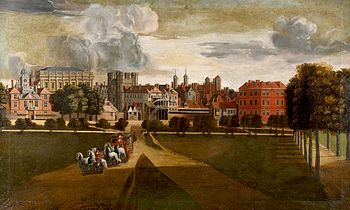‘Sunday 3 February 1666/67
(Lord’s day). Up, and with Sir W. Batten and [Sir] W. Pen to White Hall, and there to Sir W. Coventry’s chamber, and there staid till he was ready, talking, and among other things of the Prince’s being trepanned, which was in doing just as we passed through the Stone Gallery, we asking at the door of his lodgings, and were told so. We are all full of wishes for the good success; though I dare say but few do really concern ourselves for him in our hearts..’.
In Samuel Pepys’s Diary, Prince Rupert of the Rhine was a topic of discussion in the Stone Gallery; Whitehall Palace on February 3rd. These two subjects play a role in Walter Scott’s “Peveril of the Peak” as well, though the setting is ten years later than Pepys’s diary entry. Another twenty years, or so, and Whitehall Palace which was the largest palace in Europe at the time, was destroyed by fire (1698). The following is from Scott’s Peveril:
‘Sir Geoffrey was unwilling, like most prudent persons, to own the existence of expectations which had proved fallacious, yet had too little art in his character to conceal his disappointment entirely. "Who, I, madam?" he said; "Alas! what should a poor country knight expect from the King, besides the pleasure of seeing him in Whitehall once more, and enjoying his own again? And his Majesty was very gracious when I was presented, and spoke to me of Worcester, and of my horse, Black Hastings--he had forgot his name, though--faith, and mine, too, I believe, had not Prince Rupert whispered it to him. And I saw some old friends, such as his Grace of Ormond, Sir Marmaduke Langdale, Sir Philip Musgrave, and so forth; and had a jolly rouse or two, to the tune of old times."…’
